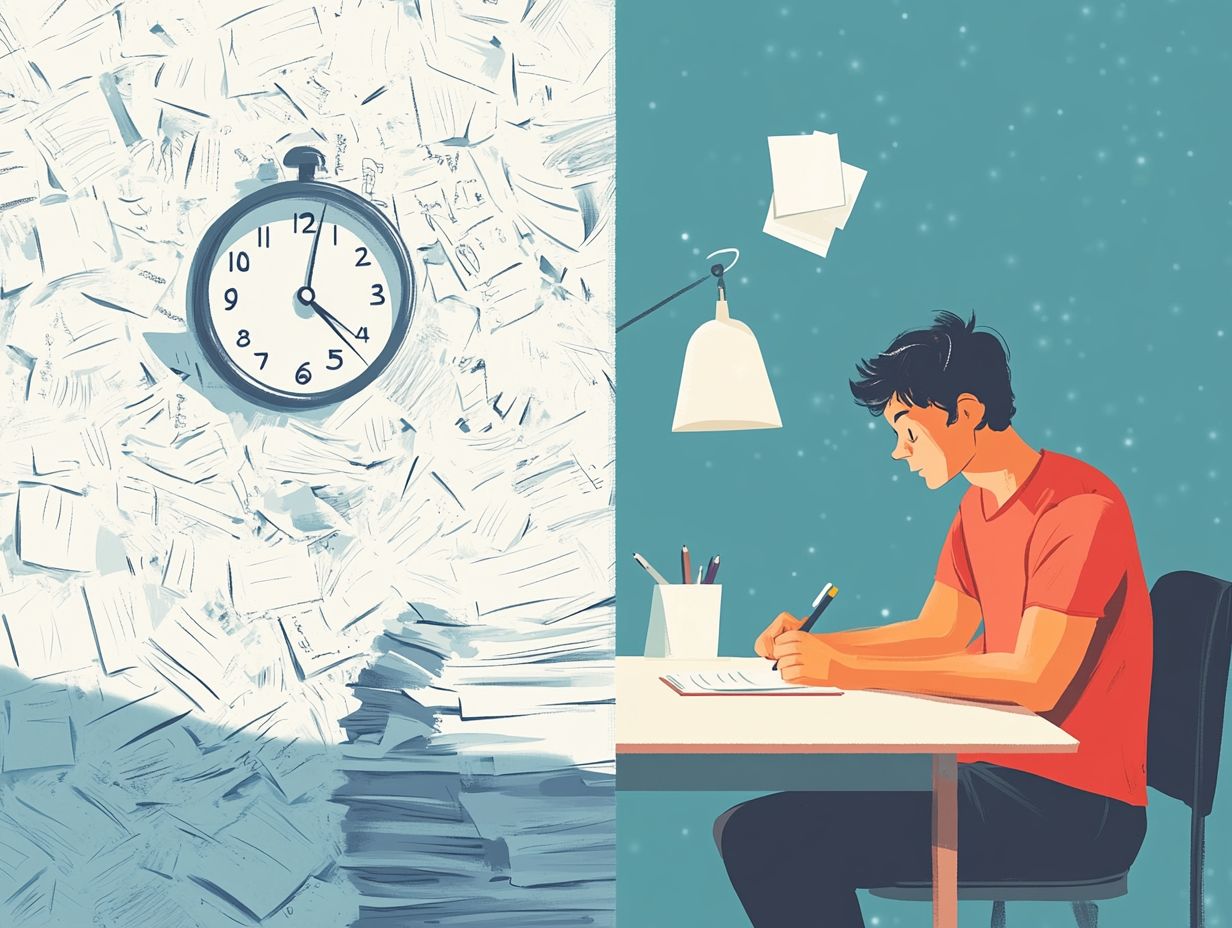Understanding the Link Between Fear and Procrastination
Fear and procrastination often dance together, forming a cycle that can impede your productivity and overall well-being.
This exploration delves into the intricate relationship between these two forces. It begins with precise definitions that set the stage and investigates how fear ignites procrastination. You will gain insights on recognizing and confronting your fears head-on.
This piece also provides practical strategies to liberate yourself from this unproductive pattern.
By overcoming these barriers, you can elevate your productivity and enhance your mental health. Take control of your time and emotions today!
Contents
- Key Takeaways:
- The Relationship Between Fear and Procrastination
- The Effects of Fear on Procrastination
- Breaking the Cycle of Fear and Procrastination
- Managing Fear and Procrastination in Daily Life
- The Benefits of Overcoming Fear and Procrastination
- Frequently Asked Questions
- What is the connection between fear and procrastination?
- How does fear contribute to procrastination?
- Can fear actually be beneficial in preventing procrastination?
- How can I overcome fear-induced procrastination?
- Are there different types of fears that can lead to procrastination?
- How can understanding the link between fear and procrastination help me?
Key Takeaways:
- Fear and procrastination are closely linked, with fear often being a major contributing factor.
- Fear can lead to procrastination by causing avoidance, perfectionism, and a lack of motivation.
- Breaking the cycle involves identifying and addressing fear, and implementing practical strategies.

The Relationship Between Fear and Procrastination
The connection between fear and procrastination runs deep, often resulting in negative emotions like the fear of failure and fear of judgment.
These feelings can propel you into a cycle of ongoing procrastination. Research from experts like Joseph Ferrari at Carleton University underscores the importance of understanding these links for better emotional regulation and effective time management.
By recognizing the sources of your fears, you empower yourself to practice self-forgiveness and take steps toward breaking free from procrastination.
Defining Fear and Procrastination
Defining fear and procrastination requires diving into the emotional layers that fuel avoidance behavior.
These feelings can influence your emotional regulation, leading you to postpone tasks to sidestep discomfort. When confronted with challenges, you may instinctively procrastinate, allowing fear to take control.
This avoidance can spiral into a cycle where the anxiety associated with unmet obligations intensifies, reinforcing your reluctance to engage.
Such patterns impede your personal growth and foster a sense of inadequacy impacting your self-esteem and overall well-being. Recognizing this connection is essential for dismantling the barriers that fear constructs.
The Effects of Fear on Procrastination
Fear can profoundly influence your tendency to procrastinate, significantly affecting your ability to complete tasks.
As you grapple with those underlying negative emotions, they can impede your ability to act decisively.
How Fear Can Lead to Procrastination

Fear can subtly lead you into the trap of procrastination, manifesting as avoidance behavior.
You might find yourself delaying tasks to escape discomfort, ultimately harming your emotional regulation.
This avoidance often roots in a fear of failure or judgment, leaving you feeling paralyzed at the thought of a daunting project.
For instance, a student anxious about criticism on a paper may choose to mindlessly scroll through social media instead of writing. This delay amplifies feelings of anxiety and self-doubt, creating a vicious cycle.
Over time, you may notice a tendency to sidestep not only academic responsibilities but various life challenges as well. This behavior can lead to psychological consequences like low self-esteem and chronic stress.
It is crucial to confront those fears head-on to break free from this cycle.
Breaking the Cycle of Fear and Procrastination
Breaking the cycle of fear and procrastination requires you to identify and confront the fears that drive your avoidance. By doing so, you empower yourself to embrace self-compassion and take small, deliberate steps toward overcoming procrastination.
Each step forward is not just progress; it s a testament to your inner strength and commitment to personal growth.
Identifying and Addressing Fear
Identifying and addressing your fears is essential for overcoming procrastination. By recognizing specific fears like anxiety about potential failure you can achieve better emotional regulation and develop effective coping strategies.
Confront these fears by journaling your thoughts and feelings about your tasks. This practice reveals your hidden anxieties and paves the way for exploring their origins.
Next, consider employing techniques from a type of therapy that helps you change negative thoughts. Challenge distorted beliefs by reframing negative thoughts into actionable, positive affirmations. Mindfulness being present and aware of your thoughts and feelings can help you become aware of your fear responses in the moment, allowing for more informed decision-making.
Gradually exposing yourself to feared scenarios in manageable steps becomes a powerful method for desensitization, ultimately nurturing resilience and motivation within you.
Tips for Overcoming Procrastination
To effectively tackle procrastination, you can employ a variety of tips and strategies that will elevate your productivity. Focus on enhancing your time management skills, practicing self-efficacy, and learning to forgive yourself for any past mistakes.
Breaking tasks into smaller, manageable pieces can significantly diminish feelings of overwhelm, allowing you to celebrate a sense of accomplishment with each completed segment. Set specific, achievable goals to provide you with clearer focus, further igniting your motivation.
Utilizing tools like planners or digital apps will assist you in prioritizing tasks while keeping track of your progress.
Emphasizing self-discipline and recognizing your personal triggers can help cultivate a more productive mindset. Embrace a growth mindset to learn from setbacks, fostering resilience and ultimately transforming procrastination into a proactive approach to both personal and professional challenges.
Managing Fear and Procrastination in Daily Life

Managing fear and procrastination in your daily life demands practical strategies that you can seamlessly weave into your routine. This fosters a proactive approach, empowering you to tackle tasks head-on while addressing any underlying fears.
Practical Strategies for Dealing with Fear and Procrastination
Practical strategies for tackling fear and procrastination can significantly enhance your emotional regulation and improve your time management, ultimately leading to more effective task completion.
By breaking tasks into smaller, manageable chunks, you can transform daunting projects into something much more approachable. Set specific deadlines to ignite your motivation!
Incorporating mindfulness and deep-breathing exercises can calm your mind, while positive affirmations help shift your focus away from fear. Establishing a reward system for completed tasks fosters a sense of achievement and encourages your continued progress.
Engaging in regular self-reflection to identify your triggers and patterns empowers you to tackle procrastination tendencies effectively.
The Benefits of Overcoming Fear and Procrastination
The benefits of conquering fear and procrastination are truly extensive. You can experience a noticeable boost in productivity, an uplift in your mental well-being, and the ability to better regulate your emotions.
This journey not only leads to personal growth but also empowers you to unlock your full potential.
Improving Productivity and Mental Well-being
Improving your productivity and mental well-being comes from overcoming procrastination. By managing your emotions and confronting your fears, you can act with confidence.
When you actively engage in tasks instead of delaying them, you not only complete your work efficiently but also feel a strong sense of achievement. This significantly boosts your self-esteem.
Managing your emotions is essential. It transforms anxiety into motivation, leading to clearer thinking and reduced stress levels.
As you gain control over your procrastination habits, you’ll notice remarkable improvements in your time management. This leads to a more organized and fulfilling life. The positive feedback loop created by this growth reinforces healthy behavioral patterns, further enhancing your emotional stability and overall productivity.
Frequently Asked Questions

What is the connection between fear and procrastination?
Fear and procrastination are closely linked. When we are afraid of something, we tend to avoid it, leading to understanding the role of fear in procrastination.
How does fear contribute to procrastination?
Fear can lead to procrastination in multiple ways. It causes us to doubt our abilities, fear failure or rejection, and creates anxiety. This overwhelming fear often results in procrastination as we try to avoid facing our challenges.
Can fear actually be beneficial in preventing procrastination?
In some situations, fear can help prevent procrastination. It can motivate us to act quickly in the face of a deadline or challenging task. However, recognize when fear becomes overwhelming and starts hindering your productivity.
How can I overcome fear-induced procrastination?
To overcome fear-induced procrastination, identify the root cause of your fear. Address and manage your emotions through techniques such as mindfulness, positive self-talk, and breaking tasks into smaller, manageable steps. Act quickly your productivity depends on it!
Are there different types of fears that can lead to procrastination?
Yes, various fears can contribute to procrastination. Common ones include fear of failure, fear of success, fear of judgment or criticism, and fear of the unknown. Each type of fear can impact our productivity differently.
How can understanding the link between fear and procrastination help me?
Understanding the connection between fear and procrastination allows you to identify and address underlying fears. It helps you develop strategies to manage your emotions and improve productivity. Recognizing the link between procrastination and motivation can help you break the cycle of fear and procrastination, making you more productive and successful.






